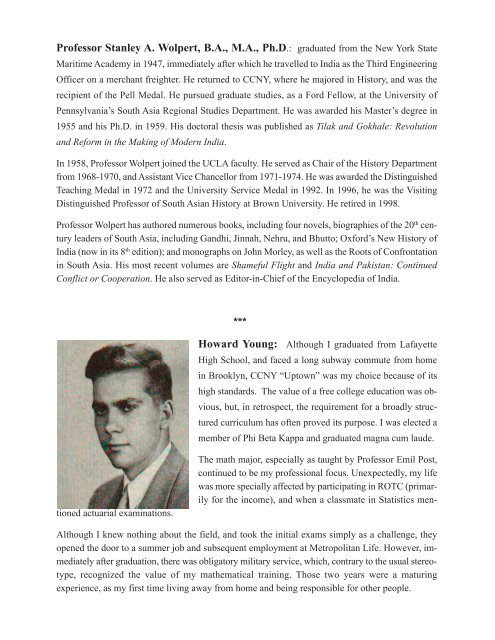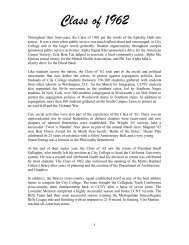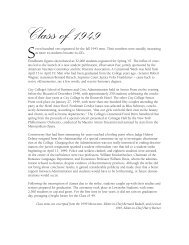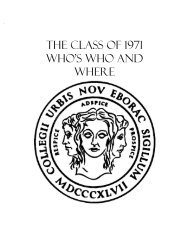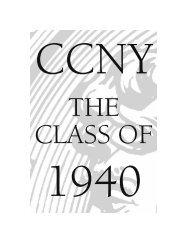CLASS OF 1953 WHO'S WHO & WHERE - The City College Fund
CLASS OF 1953 WHO'S WHO & WHERE - The City College Fund
CLASS OF 1953 WHO'S WHO & WHERE - The City College Fund
Create successful ePaper yourself
Turn your PDF publications into a flip-book with our unique Google optimized e-Paper software.
Professor Stanley A. Wolpert, B.A., M.A., Ph.D.: graduated from the New York StateMaritime Academy in 1947, immediately after which he travelled to India as the Third EngineeringOfficer on a merchant freighter. He returned to CCNY, where he majored in History, and was therecipient of the Pell Medal. He pursued graduate studies, as a Ford Fellow, at the University ofPennsylvania’s South Asia Regional Studies Department. He was awarded his Master’s degree in1955 and his Ph.D. in 1959. His doctoral thesis was published as Tilak and Gokhale: Revolutionand Reform in the Making of Modern India.In 1958, Professor Wolpert joined the UCLA faculty. He served as Chair of the History Departmentfrom 1968-1970, and Assistant Vice Chancellor from 1971-1974. He was awarded the DistinguishedTeaching Medal in 1972 and the University Service Medal in 1992. In 1996, he was the VisitingDistinguished Professor of South Asian History at Brown University. He retired in 1998.Professor Wolpert has authored numerous books, including four novels, biographies of the 20 th centuryleaders of South Asia, including Gandhi, Jinnah, Nehru, and Bhutto; Oxford’s New History ofIndia (now in its 8 th edition); and monographs on John Morley, as well as the Roots of Confrontationin South Asia. His most recent volumes are Shameful Flight and India and Pakistan: ContinuedConflict or Cooperation. He also served as Editor-in-Chief of the Encyclopedia of India.***Howard Young: Although I graduated from LafayetteHigh School, and faced a long subway commute from homein Brooklyn, CCNY “Uptown” was my choice because of itshigh standards. <strong>The</strong> value of a free college education was obvious,but, in retrospect, the requirement for a broadly structuredcurriculum has often proved its purpose. I was elected amember of Phi Beta Kappa and graduated magna cum laude.<strong>The</strong> math major, especially as taught by Professor Emil Post,continued to be my professional focus. Unexpectedly, my lifewas more specially affected by participating in ROTC (primarilyfor the income), and when a classmate in Statistics mentionedactuarial examinations.Although I knew nothing about the field, and took the initial exams simply as a challenge, theyopened the door to a summer job and subsequent employment at Metropolitan Life. However, immediatelyafter graduation, there was obligatory military service, which, contrary to the usual stereotype,recognized the value of my mathematical training. Those two years were a maturingexperience, as my first time living away from home and being responsible for other people.


